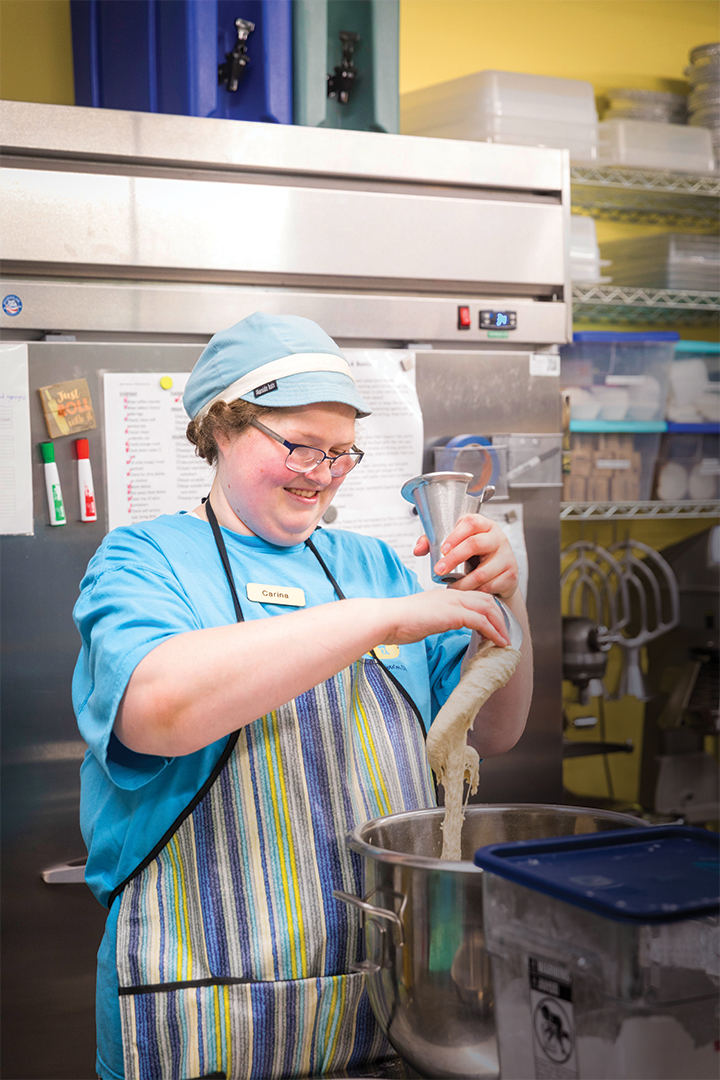When Carina Comer MBA’15 was nine months old, a cancerous brain tumor took all of her vision in one eye and some in the other. Over the next 15 years, two more tumors appeared. Comer hit a low at age 7, during radiation treatment for her second tumor, when she sat in a Boston hospital lacking hope, friends and any sense of what would happen next.
Then came a special delivery —piles of toys, cards and clothes from a nearby elementary school.
“They didn’t know me, but word got around that I was staying there and needed encouragement,” Comer recalls. “From that moment on, I wanted to pay that forward.”
Already infatuated with the craft and traditions of baking, Comer did a bake sale for children with similar serious health problems. Unfortunately, because she was selling her baked goods from a main street, people said she was affecting traffic — her charity operation didn’t meet city codes, they protested.
So, Comer did what she always does. She worked the problem.
By making the operation mobile (she used a tricycle to make deliveries), she got rid of the traffic issue. Soon she was even traveling back to Boston — a two-hour drive from her Connecticut hometown — to take baked goods to kids in the same hospital where she had been treated.
She did this for 10 years. All told, she probably raised $20,000.
Resilience. That’s the lesson here. It’s the lesson infused in just about everything Comer creates.
Making it happen
After attending culinary school, Comer realized she needed a business foundation to go out on her own. Willamette’s MBA program, with its entrepreneurial emphasis and focus on nonprofits, seemed a natural fit.
In her second year in the program, Comer had to take a leave of absence to get her third tumor treatment. The Willamette MBA family made it work, with her peers taking notes for her or going over the lectures with her after class.
“People in the MBA learning center helped me craft an academic plan, and classmates helped make it happen,” she says. “As long as I was courageous enough to ask for help, people would do anything.”
An internship at the IKE Box coffee shop in Salem gave Comer yet another reason to go into professional baking. She loved the nonprofit side of the IKE Box — its partner organization, Isaac’s Room, provides local young people with job skills and a community they might lack elsewhere — but she noticed that the baked goods were from Costco. She approached the owner and got an internship as manager and organizer of a baking program, which provided yet another avenue for job training and practical experience.
Making the most of talent
In 2017, Comer opened Carina’s Bakery, purveyor of scrumptious treats informed by her family’s Scandinavian traditions and her own vegan focus, in Beaverton, Oregon. There’s the smörgås, which she describes as “open-faced works of art that take the place of your average sandwich,” as well as a range of snack cakes, bar cookies, Danishes, tortås (Swedish meringue-topped cakes) and more.
After working in the food industry and at IKE Box, Comer realized the need for employment of people with disabilities at her bakery. As she says, “I wanted to make a difference in a community of talented people who often go unappreciated.” It doesn’t actually take much to organize the business to meet their needs — she uses larger-print recipe cards, for example, and simply reminds people that these things take time. Most customers get it.
Still, Comer runs a business according to the standards of an industry built for people without disabilities. Back when Carina used to use a commissary kitchen to work out her startup ideas and find her market, she lost all the proceeds brought in by a trade show by paying for the space and storage costs of the hourly rental. The system presumes that you’re fully sighted, fully mobile, and can manage the gear and preparations on your own within time constraints. Comer couldn’t. She did the event anyway.
A different approach
“This world is far different than home baking as a hobby,” Comer notes, “a fact I discovered as soon as I moved on from peddling molasses crinkles and cardamom bread from a tricycle.”
Times aren’t always easy, and the bakery is still searching for a core audience — but Comer is making it work. She already has dreams of expansion — into a second bakery and, eventually, a nonprofit focused around entrepreneurs with disabilities.
Partly, it’s her entrepreneurial spirit and specific skills she picked up at Willamette, but it also boils down to resilience and a willingness to be true to herself. As she puts it, “I just see the world a bit differently than most.”
This article was originally published in the fall 2018 issue of Willamette magazine as part of a larger article, “The GOOD food and drink guide: Alumni serve up satisfying fare — and solutions for social issues.” Erik Schmidt is a freelance writer in Denver.

